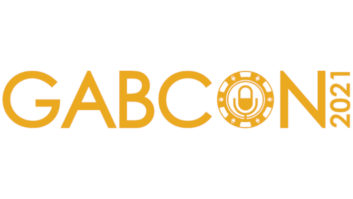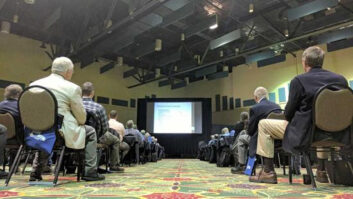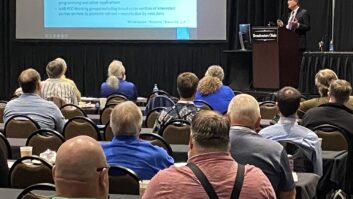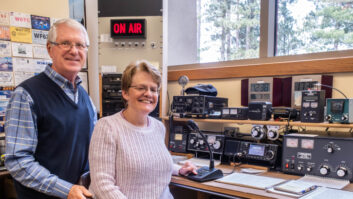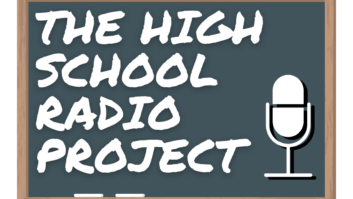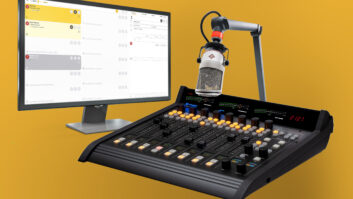Podcasting, social media, ’zines, LPFM, the FCC and journalism were among the topics tackled at College Broadcasters Inc.’s fifth annual National Student Electronic Media Convention. Held in Philadelphia in October, the event drew a crowd of some 420 paid attendees in addition to guest speakers and sponsors.

Awards lined up prior to the 2016 National Student Production Awards ceremony.
With an emphasis on radio, television and multimedia, the NSEMC is geared toward students and staff working at high school and college electronic media organizations, primarily mainly radio and TV stations.
FORGING STATION CONNECTIONS
Sessions included a mix of practical advice, hands-on learning and wide-ranging discussions. A big draw was the opportunity to network with other student radio/TV participants as well with established industry professionals. To that end, there were numerous roundtable discussions during which students and station advisers could chat with their peers about common goals and challenges.
CBI Student Representative Evan Boyd said that his favorite parts of the event related to connecting with students from other stations. He was the driving force behind a new “Student Social,” which took place the night before the conference opened.


CBI IT Content Director Jessica Clary of SCAD Atlanta tests out the photo station before the awards ceremony.Signage leading attendees to registration at the 2016 NSEMC.
Boyd, a University of Wisconsin-Madison senior and WSUM(FM)’s station manager, said the social went well. “It helped [us] get to know people before everything started, and I think it will help stations collaborate in the future. I even know that right after, different stations went out together to visit an art museum — hearing that they socialized after the event made it all worth it.”
Those ties grew even stronger throughout the conference, and Boyd said his “favorite part of the conference was leading a Program Director Roundtable, in which I was able to get to know a lot of the different radio stations and see how they operate.”
In some cases, connections forged between stations have led to collaborative projects.
In her talk “Extending the Brand: Not Just about the Radio Signal Anymore,” SCAD Atlanta Radio Adviser Millie De Chirico described her station’s participation in a Halloween parade alongside fellow Atlanta college radio stations WREK(FM) of Georgia Tech, WRAS(FM) of Georgia State and WMRE(FM) of Emory University. With a shared theme of “College Radio Isn’t Dead,” the college radio station members dressed like zombies — aka “the undead” — during the celebration.
In addition to the on-site activities, a few off-site station tours were offered as optional excursions. Along with De Chirico, I led a field trip to see student-run college radio station WKDU(FM) at Drexel University. Others took attendees to see Greater Philadelphia Media and WTFX(TV) Fox 29. At WKDU, participants saw the studios, chatted with station participants and even took a group photo with a strange alien doll that was perched in the live music room.

Lucy Noland addresses the crowd during the NSEMC awards ceremony.

A collection of radio station promotional items collected during the conference.
DOING RADIO IN A MULTIMEDIA WORLD
Another conference theme was multimedia convergence, with an emphasis on the myriad ways that radio and television stations can connect with their audiences in 2016.
“There were a lot of sessions on how to do more than just being an on-air DJ, including sessions on social media, news reporting, and getting to know your staff better,” Boyd said. “Being just an on-air DJ does not even come close to covering what you can experience in college radio.”
Sessions dug into the nuts and bolts of fundraising, podcasting, cause marketing, multimedia journalism and localism. Technical topics were also well represented, with an engineering roundtable, radio/audio clinics and sessions on HD Radio, video production and a full-day pre-conference workshop on the MusicMaster automation system and a half-day session focused on Adobe Creative Suite’s broadcast package. Those interested in low-power FM had an opportunity to sit in on a full-day pre-conference LPFM Workshop led by REC Networks and Prometheus Radio Project.
2016 ELECTION
With the timing of the presidential election, Glenn Schuck’s Saturday keynote was a fitting conclusion to the conference. A former college radio DJ/station manager at Seton Hall University’s WSOU(FM), Schuck is now an anchor/reporter for WINS(AM), the well-known commercial news radio station in New York City.
Schuck characterized the 2016 presidential election as “bizarre” and “divisive” and implored the students in the room to vote, reminding them that “voting’s a privilege” and telling students “you have to vote.” He pointed out that although many people are expressing fatigue with the election, stations focusing on election coverage have been receiving their highest ratings ever.

Students from WLOY at Loyola University Maryland broadcast live from the CBI cybercast.
His talk was a mixture of light-hearted anecdotes and sage advice, with Schuck recounting that he has had “strange interactions” with Hillary Clinton and Donald Trump during his years as a reporter in New York. As far as covering elections, Schuck said, “I find it kind of challenging and fun,” but added that he has concerns about “freedom of the press and how that might be interfered with” when campaigns are putting restrictions on reporters.
Schuck closed his speech on an inspirational note, saying that working in media has allowed him to be “a witness to history” and telling students, “Your whole future is ahead of you.” As he shared photos of himself in close proximity to celebrities, including Pope Francis and a life-sized Twinkie, he said, “These are the things that can come your way” if students stay in the business.
AWARDS AND ADVICE FOR FUTURE BROADCASTERS
The convention wrapped up with CBI’s National Student Production Awards ceremony, emceed by Fox 29 co-anchor Lucy Noland.

Student peruses vintage WPRB DJ notebook during High School and College Radio History Show and Tell.

Students and advisers on the tour of WKDU(FM) at Drexel University.
Courtesy WKDU/Cooper Beaupre
A record 929 entries were submitted across 24 categories, ranging from Best Audio Sports Reporting — WSUM(FM) scored first place; to Best Video Documentary/Public Affairs — first place went to work from Taylor University’s Media Communication program; to Best DJ — a DJ at WZND(LP) Fuzed Radio was the winner; to Best Student Media Website — KTXT(FM) took first place.
Noland kicked off the ceremony with her own words of advice. As a former college DJ at KSUA(FM), she reflected on her early days of editing audio with razor blades, compared with today, when much of her work is done using her smartphone.
She held up her phone, saying, “This is the future” and said that “It’s rare for us to have a camera person and an audio person” when out in the field today.
Reiterating the importance of social media (a theme echoed throughout the conference), Noland said that she’s “mandated” to have Facebook, Instagram and Twitter accounts as part of her job. Soon she’ll be adding Snapchat to the mix.
After presenting awards to all of the winners, Noland gave some parting wisdom, telling the future media professionals in the room, “This job is your backstage pass to the world.”
“You can ask the questions that everyone else is wondering about” and “help this world of ours,” Noland implored.
With that, the 2016 National Student Electronic Media Convention was a wrap. The 2017 convention will be held Nov. 2–4 in San Antonio, Texas, and planning is underway, with some intriguing session ideas proposed during a roundtable on the final day of the Philly event.
In thinking ahead, Boyd said, “I hope that next year’s conference in San Antonio can continue to stress radio and TV as multimedia outlets while increasing the roles of news, sports and talk platforms. A lot of college radio revolves around the music aspect, but students willing to learn about news, sports, talk, social media, production, etc. will soon discover how cool … [the] industries [of] radio and TV can be.”





